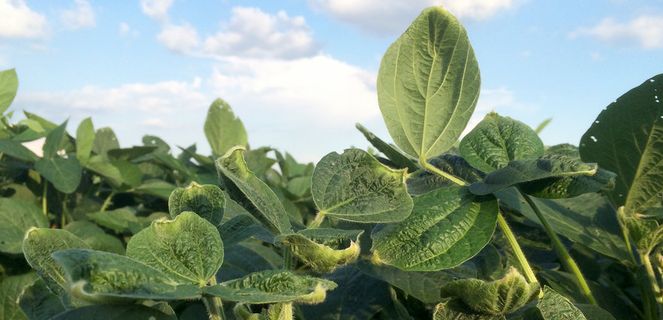Dicamba banned in Arkansas for the 2018 growing season, lawsuits filed
by January 19, 2018 4:36 pm 1,098 views

The controversial herbicide dicamba cannot be used by Arkansas farmers during the bulk of the 2018 growing season. The Arkansas Legislative Council voted Friday (Jan. 19) to invoke an Arkansas State Plant Board regulation to prohibit its use from April 16 through Oct. 31.
The rule will be filed with the Arkansas Secretary of State’s Office and will be in effect 10 days after its filed. This is the final step in the process, and now farmers know for certain it won’t be available this year, Arkansas Agriculture Secretary Wes Ward told Talk Business & Politics.
“The decision is out there … now farmers can prepare,” Ward said.
The regulations include exemptions for the use of dicamba in pastures, rangeland, turf, ornamental, direct injection for forestry, and home use.
Two lawsuits have been filed against ASPB in an effort to compel the agency to relax the rule. A group of farmers has filed one of the suits, while the other was filed by Monsanto, the company that sells dicamba in Arkansas. Ward wasn’t sure if or when the suits will be settled, and even if a ruling were to be rendered in favor of the farmers or Monsanto, the window to lock-in inputs such as seeds and herbicides is closing fast.
“We will see how it plays out,” Ward said.
Monsanto officials told TB&P the company is disappointed by the decision.
“This is a sad day for Arkansas growers. Once again these farmers will be placed at a disadvantage compared to the soybean and cotton growers in 33 other states who will have access to the most modern technology that has proven to be so successful in controlling those difficult to manage weeds,” said Monsanto Vice-President of Global Strategy Scott Partridge. “The growers I spoke to this morning are also worried that this decision sends a message from state politicians and policymakers that Arkansas will be slow to accept new technologies in the future.”
The fight about dicamba will likely continue into next year, Ward said. A lot of research will be compiled and examined in the coming months. The state wants farmers to have access to the newest technologies to ensure better yields, he said. Towards the end of the year, the debate will be renewed.
“I expect this to remain a divisive issue,” he said.
ASPB made the decision to ban dicamba after it received about 1,000 damage complaints in May, primarily in Northeast Arkansas, potentially caused from dicamba drift. The decision was highly controversial, but the board decided the risks were too significant. Dicamba is an effective weed control herbicide, but the damage it can cause to other crops and farmers has to be considered. The higher fines are meant to serve as a significant deterrent to potential violators. ASPB investigates and reviews complaints.
Dr. Mark Cochran, vice president-agriculture for the University of Arkansas System, said the decision was based on the best evidence available when it was made by ASPB in November.
“The plant board and the dicamba task force that preceded it made a decision based on the best evidence from land grant research conducted not only by the scientists of the University of Arkansas System Division of Agriculture, but also by their peers in Missouri, Tennessee, Indiana, and other states, and from additional information made available from all other sources. We are proud of the work that our weed scientists and agronomists have done in service to the people of Arkansas and beyond,” Cochran noted in a statement. “Our weed scientists and agronomists will continue to work diligently toward tools and techniques to help Arkansas farmers economically manage the challenge of resistant weeds.”
Dicamba has been banned in several states. Dicamba has been used as an herbicide for more than 50 years to manage 200 broad leaf weeds. It is a Weed Science Society of America Group 4 synthetic auxin – a plant hormone that causes plants to exhibit uncontrolled growth, according to the University of Arkansas. It is more volatile in warmer climates.
ASPB decided earlier this year to allow one formulation, Engenia dicamba, to be used in the state to fight pigweed, an aggressive weed that has plagued farmers in recent years. About 35% of the state’s 3.5 million soybean acres were planted with genetically-altered dicamba tolerant seeds. About 75% (300,000 acres) of the state’s cotton crop was planted with dicamba resistant seeds.
Scientists theorized dicamba was drifting into adjacent crop fields, gardens, and other places. Misapplications, weather conditions, or some other unknown factors may have caused the alleged drift. Tests proved the new formulations were less volatile than older ones, but there was still volatility, and it could last up to 36 hours after it was sprayed. Dicamba can attach to dust particles, meaning it can travel much further from target sites than previously thought.
Some additives enhanced the volatility. Ammonium sulfate and glufosinate increase the damage capabilities of dicamba. Researchers found damage could spread up to 220 feet away from an application site, nearly double the buffer distance the Environmental Protection Agency requires between dicamba and non-dicamba fields. Tests showed that if the wind blew in one direction for several hours, drift could cause damage on adjacent fields and then if the wind changed hours later, the same amount of damage would be caused there.
